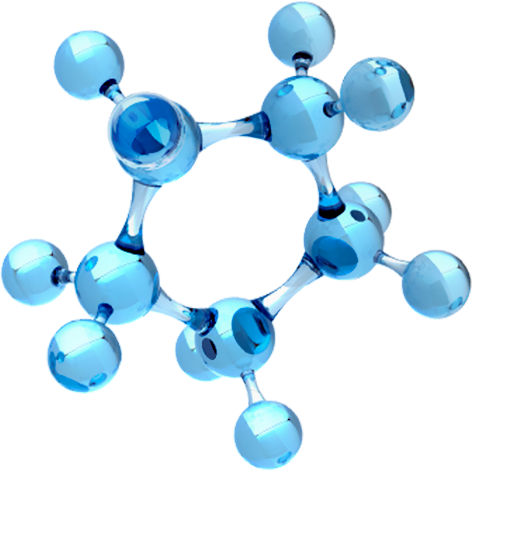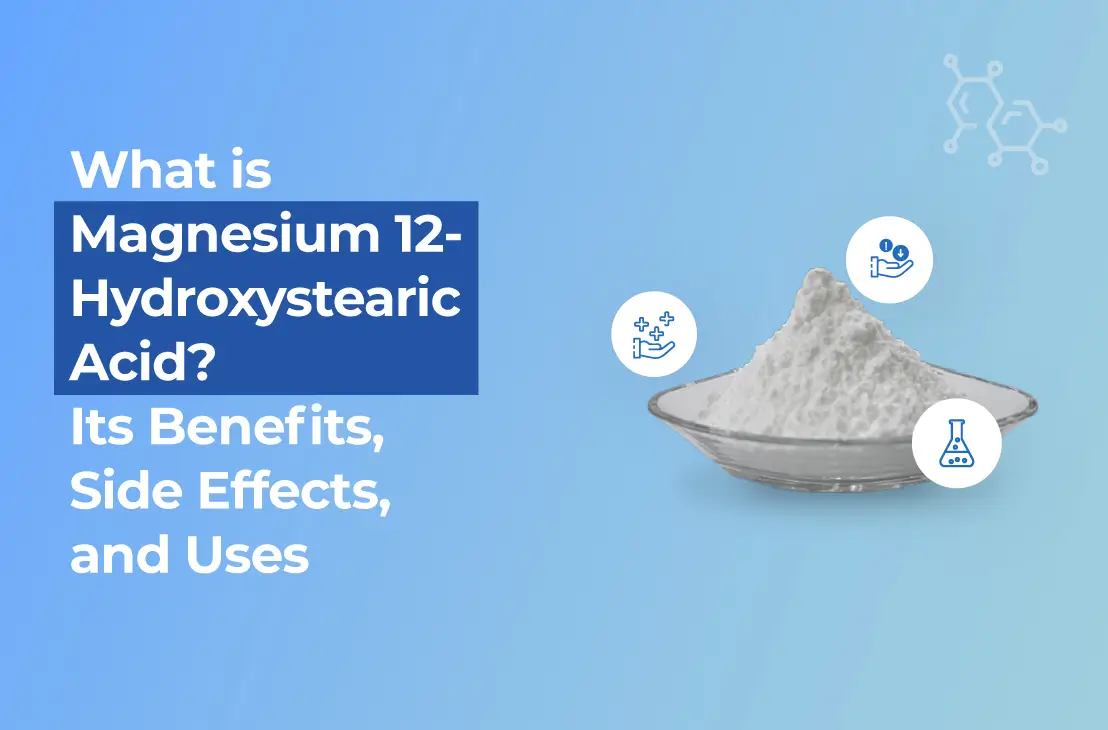Magnesium stearate is a widely used compound in the pharmaceutical industry, known for its ability to enhance the quality and efficiency of drug manufacturing processes. As an essential excipient, magnesium stearate plays a critical role in ensuring the effective production of tablets and capsules, making it an indispensable component of modern pharmaceuticals. This blog explores the role of magnesium stearate in pharmaceutical manufacturing, its benefits, and its impact on the final product.
What is Magnesium Stearate?
Magnesium stearate is a fine, white powder composed of magnesium, stearic acid, and other fatty acids. It is primarily used as a lubricant in tablet and capsule production. Magnesium stearate is a salt formed from the combination of magnesium and stearic acid, a naturally occurring fatty acid. The compound is known for its hydrophobic (water-repellent) properties and its ability to prevent ingredients from sticking together during the manufacturing process.
Magnesium stearate’s unique chemical structure allows it to function effectively as a lubricant, ensuring that pharmaceutical ingredients are processed smoothly and efficiently in the production of tablets, capsules, and other solid dosage forms.
The Role of Magnesium Stearate in Pharmaceutical Manufacturing
-
Lubrication in Tablet and Capsule Production
The primary function of magnesium stearate in pharmaceutical manufacturing is as a lubricant. During the tablet and capsule production process, powders and granules are compressed to form solid dosage forms. These ingredients can be sticky and difficult to handle due to their cohesive nature. Magnesium stearate, when added to the formulation, reduces friction between the materials, allowing for smoother and more efficient processing.
By reducing friction, magnesium stearate ensures that the machinery used in manufacturing, such as tablet presses and capsule filling machines, operates without excessive wear and tear. It also helps prevent ingredients from sticking to the equipment, making it easier to release the final product from molds or dies.
-
Improved Flowability of Powders
Magnesium stearate improves the flowability of powders and granules. In tablet manufacturing, uniform flow of the powdered ingredients is critical for ensuring consistency in weight and content uniformity. Magnesium stearate prevents clumping and caking of the powder, ensuring a smooth flow through the manufacturing equipment. This leads to better homogeneity in the final tablet or capsule product.
-
Ensures Consistent Weight and Size
In pharmaceutical manufacturing, ensuring that tablets and capsules have consistent weight and size is essential. Inaccurate weight can lead to variations in the dosage, which can impact the drug’s efficacy and safety. Magnesium stearate helps improve the consistency of tablet and capsule production by ensuring that the ingredients flow properly and the pressure applied during compression is uniform.
-
Prevention of Cross-Contamination
In a manufacturing environment where multiple formulations are being processed, cross-contamination is a significant concern. Magnesium stearate’s role as a lubricant can help prevent cross-contamination by ensuring that the ingredients do not stick to the machinery or equipment. This reduces the likelihood of carryover between batches, maintaining the integrity of each formulation and reducing the risk of contamination.
-
Facilitates Smooth Compression and Coating
During tablet manufacturing, powders and granules are compressed into tablets using high pressure. Magnesium stearate assists in this compression process by ensuring that the ingredients do not bind together too tightly, which can lead to issues such as uneven compression or poor tablet hardness. Additionally, magnesium stearate is often used in the coating process of tablets, where it prevents the coating from sticking to the tablet or the equipment. This ensures a smooth, uniform coating on the tablets, which is essential for aesthetic and functional purposes, such as controlled release of the active ingredients.
Benefits of Magnesium Stearate in Pharmaceutical Manufacturing
-
Enhanced Manufacturing Efficiency
By acting as a lubricant and improving the flowability of powders, magnesium stearate helps streamline the manufacturing process. This results in fewer manufacturing delays, increased throughput, and reduced downtime in production. Pharmaceutical companies can produce high-quality tablets and capsules more efficiently, reducing costs and improving profitability.
-
Improved Product Quality
The smooth manufacturing process facilitated by magnesium stearate leads to tablets and capsules that are uniform in size, weight, and appearance. This uniformity is crucial for ensuring that the active pharmaceutical ingredient (API) is distributed evenly across all dosage units, providing patients with consistent and reliable doses.
-
Cost-Effective
Magnesium stearate is an affordable excipient, making it a cost-effective solution for pharmaceutical manufacturers. Its multifunctionality—acting as a lubricant, binder, and anti-caking agent—helps reduce the need for additional excipients, which can further lower manufacturing costs. This cost-effectiveness contributes to the affordability of the final pharmaceutical product.
-
Non-toxic and Safe
Magnesium stearate is generally regarded as safe for use in pharmaceutical applications. It is non-toxic and well-tolerated by most patients. The compound is used in small amounts in formulations, making it safe for consumption. Additionally, it has a long history of use in the pharmaceutical industry, which provides confidence in its safety profile.
Considerations When Using Magnesium Stearate
While magnesium stearate offers numerous benefits, its use should be carefully controlled. Excessive amounts of magnesium stearate can lead to formulation issues. For instance, too much magnesium stearate can hinder the disintegration and dissolution of tablets, which can affect the bioavailability of the drug. Manufacturers need to optimize the quantity of magnesium stearate used to ensure that it provides its lubricating benefits without compromising the performance of the final product.
Moreover, some studies suggest that magnesium stearate can have a slight impact on the absorption rate of certain drugs, although the effect is generally minimal and not considered a major concern for most formulations.
Magnesium Stearate in the Context of Other Excipients
Magnesium stearate is often used in combination with other excipients, such as binders, fillers, and disintegrants, to create well-rounded pharmaceutical formulations. Each excipient serves a distinct purpose in the formulation, and magnesium stearate’s role is critical in ensuring that these ingredients function optimally.
For example, binders help hold the tablet together, while disintegrants promote the breakup of the tablet in the digestive tract. When combined with these excipients, magnesium stearate contributes to the overall quality and performance of the tablet or capsule.
The Future of Magnesium Stearate in Pharmaceutical Manufacturing
Magnesium stearate will continue to play a crucial role in pharmaceutical manufacturing as the demand for high-quality, efficient drug production grows. With advancements in manufacturing technologies and increasing regulatory scrutiny, the pharmaceutical industry is focusing more on excipient quality and functionality. Manufacturers are continually exploring ways to optimize the use of excipients like magnesium stearate to improve drug quality, reduce costs, and streamline production processes.
In the future, pharmaceutical manufacturers may explore alternatives to magnesium stearate, driven by concerns over potential bioavailability issues or the desire for more sustainable, plant-based options. However, magnesium stearate's versatility and safety profile ensure that it will remain a staple in the industry for the foreseeable future.
Why Choose Nimbasia Stabilizers?
As a leading magnesium stearate manufacturer, supplier, and exporter, Nimbasia Stabilizers stands out in the industry for its commitment to quality, innovation, and customer satisfaction. Heres why pharmaceutical manufacturers prefer our magnesium stearate:
-
High-Quality Standards
Our magnesium stearate is manufactured with the highest quality raw materials and undergoes rigorous quality control to ensure it meets industry standards.
-
Expertise and Experience
With years of experience in the excipient manufacturing industry, Nimbasia Stabilizers understands the unique needs of pharmaceutical manufacturers and offers tailored solutions.
-
Global Reach
As an exporter of magnesium stearate, we serve clients worldwide, delivering our products to pharmaceutical companies across the globe.
-
Competitive Pricing
We offer high-quality magnesium stearate at competitive prices, helping pharmaceutical manufacturers optimize their production costs without compromising on quality.
-
Customer Support
Our dedicated customer support team ensures that our clients receive prompt and professional assistance, making the purchasing process seamless.
Conclusion
Magnesium stearate is an essential excipient in pharmaceutical manufacturing, serving a critical role in tablet and capsule production. Its lubricating properties, ability to improve powder flow, and ability to enhance product consistency make it a valuable tool for pharmaceutical manufacturers. Despite some concerns about its potential impact on bioavailability, magnesium stearate remains a safe, effective, and cost-efficient solution for enhancing manufacturing efficiency and product quality. As the pharmaceutical industry continues to evolve, magnesium stearate will continue to play a vital role in ensuring the reliable production of high-quality pharmaceutical products.
Contact Nimbasia Stabilizers today for all your magnesium stearate needs and experience the difference that quality and expertise can make in your pharmaceutical manufacturing operations.









